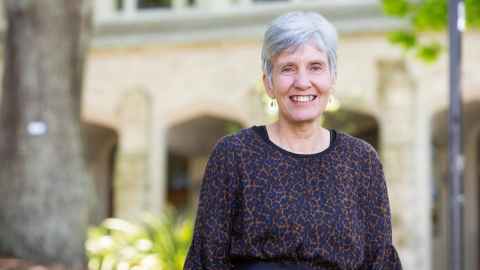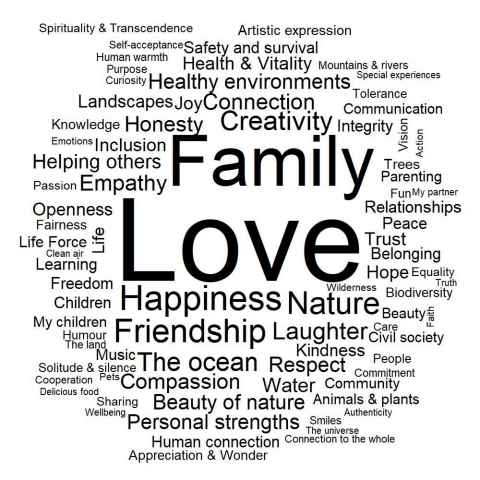The practice of love
29 October 2021
Love is arguably one of the most precious elements of the human experience and can appear in many forms. Psychology Professor Niki Harré explains generalised love and how it can enrich our world.
Ten years ago, I started a research project that involved asking people what they consider of “infinite value”. Things of infinite value were defined as that which is sacred, precious, or special, of value for its own sake; that which makes the world truly alive. People were told they could offer anything they wished including, but not limited to, emotions, relationships, parts of the natural world, objects, or qualities.
To date, I’ve asked thousands of people what they consider of infinite value; 1,080, all within Aotearoa, were part of a formal research project. The word cloud shows the offerings of these 1,080 people. As you can see, the single most common word is “love”. Some of those who offered love explained that they weren’t just talking about love of particular people, but an orientation towards the world as a whole. We could call this “generalised” love.

It is hard to articulate an orientation of generalised love precisely – or to know if people are experiencing it in the same way – but it seems to include a sense of wonder, deep appreciation for what is, and extreme benevolence – wanting the best for everything. When we are “in love” in this sense, we are fully present to the moment, the place we are in, and the people we are with.
Practising this kind of love then, involves openness to what is happening and the potential to be transformed by it. It is, I suggest, an orientation that can help us have the cross-sector, cross-culture, cross-community conversations we need to respond to the wicked problems we face, including climate change and material inequality. But how exactly do we “do love”?

Well, for a start, we try and listen to other people with genuine openness. The aim here isn’t so much respect – which involves a polite distance, but compassion – trying as best we can to learn about and understand the situation, motivations, fears and hopes of the other. A sign that you’ve got somewhere is that, at the end of the conversation, you feel as if you aren’t quite the same person you were before. If you’ve just been driven further into your corner, something is amiss.
A powerful way to set up conversations that help people listen with compassion is through structured storytelling. This invites each person to talk about their background, experiences, values, the people they are close to, and their hopes for the future. After each person has spoken, those listening reflect back some of what they have heard and how it is similar and different to their own lives. From there you can move to discussing contentious issues and making collective decisions with the sense that you are connected, and everyone has something to offer.
While it is likely almost everyone has experiences of generalised love, translating these into practice is not easy. As many religious traditions teach, the practice of love is a discipline. It is about going beyond the impulse to defend your position and assume harmful intent in those whose arguments you find abhorrent. It involves patience, courage, confidence and, ideally, a social environment that values genuine engagement.
As educators and participants in public life we would do well, I think, to foster these skills and create the social environments that enable the practice of love to flourish.
PROFESSOR NIKI HARRÉ
School of Psychology
Visit: Niki’s home page
Read: A free manual on structured storytelling and other exercises for helping people work together. http://www.infinite-game.net/manual
inSCight
This article appears in the 2021 edition of inSCight, the print magazine for Faculty of Science alumni. View more articles from inSCight.
Contact inSCight.